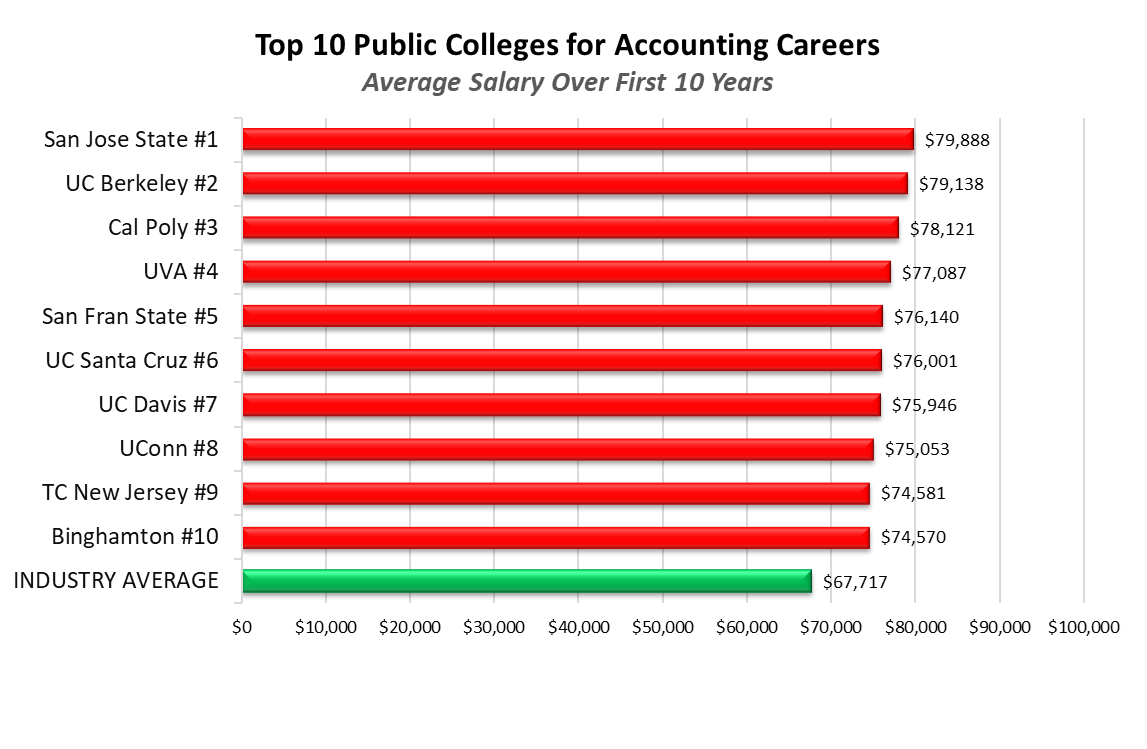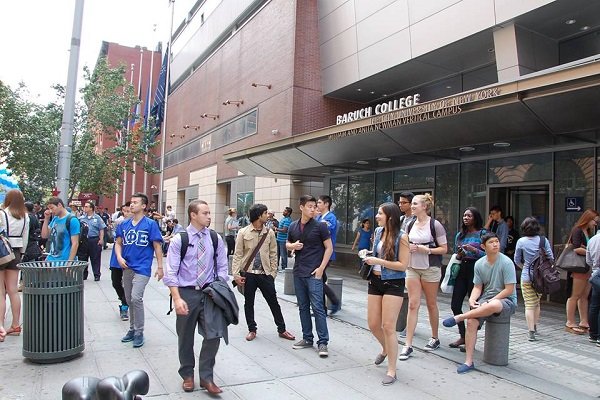Top Colleges for $$ Accounting Jobs
Summary: Where you get your undergraduate degree can have an impact on how much money you make in your accounting career. And while a few elite private universities give you the biggest salary boost, a number of top public universities offer sizable raises as well.
It’s all about the Benjamins…
Let’s say you’re planning a career in accounting, and you want to get the most bang for your buck from your undergraduate degree. Which universities regularly churn out graduates with the highest salaries? A 2023 study from the Burning Glass Institute (a nonprofit that studies employment trends) found that where you get your undergraduate degree can have an impact on how much money you make down the road. Specifically, they looked at your first ten years after graduation and asked: How much more do you make than the average person at your position?
The results…
Perhaps unsurprisingly, graduates from some of the most prestigious universities commanded the highest accounting salaries in the decade following graduation. And Harvard led the pack by a sizable margin. On average, graduates of Harvard who go into accounting make about $25,000 a year more than the national avarage. While the average annual accountant salary in the first 10 years after graduation is $67,717, the average salary for a Harvard grad is $93,111. That’s about a 37% raise. Not bad, considering you’ve probably got a lot of hefty student loans to pay off.
The other usual suspects made the list as well: #2 Duke, #3 Columbia, #4 Dartmouth, #5 UPenn, etc. While #1 Harvard was ahead of #2 Duke by a decent margin (more than $7,000), the rest of the pack were lumped pretty close together. And even #10 Georgetown commanded an average salary of $80,783, which is still $13,000 more than industry average. Bottom line: if you graduate from any of these elite schools and go into accounting, you’re going to be way ahead of the curve salary-wise.
But it’s also worth noting that less than 1% of graduates from these top colleges actually go into accounting. It’s just not a popular career. The one exception from this list was Santa Clara University, where almost 6% of graduates go into accounting. And by the way, with a 54% acceptance rate, it’s a lot easier to get into Santa Clara University than these other schools. Just saying.
The Next 10 on the list…
The next 10 Best Colleges for accounting careers tell a similar story. On average, graduates of these schools make anywhere from $10,000-$13,000 more than the national average, which is nice. But it’s worth noting that there isn’t a very big drop-off between the salaries on the Top 10 list and this list. On average, graduates of these schools make about $5,000 less than those on the Top 10 list. But, when you consider that these schools are much easier to get into, you realize that you don’t need to go to an elite school to make a decent accounting salary.
Top Public Universities…
There’s more good news. Looking to save a lot on tuition? Smart shoppers know a bargain when they see one, and there are a number of excellent public universities that give you a boost in salary when you go into accounting. Assuming you’re an in-state resident, you can cut your college costs in half, if not more, by attending one of the state schools on the list. And as you can see by the chart below, there’s virtually no difference in salary between the Tier 1 (Top 10) Public Universities and the Tier 2 (#11-#20) Private Universities.
Top public universities for accounting include #1 San Jose State, #2 UC Berkeley, #3 Cal Poly, #4 UVA, and #5 San Francisco State. Graduates of these universities command $10,000-$13,000 more than the national average, which is pretty much on-par with the 2nd Tier private universities. And when you consider how much tuition you can save as an in-state resident, it begins to look extremely appealing.
It’s also worth noting that a much higher percentage of these public university graduates go into accounting, for whatever reason. While fewer than 1% of Harvard and other Ivy League grads go into accounting, the percentages are much higher for their public university peers: #1 San Jose State (4%), UC Berkeley (2%), Cal Poly (4%), UVA (2%), San Francisco State (3%).
Rounding out the list of the “Next Best” public universities (see chart), popular universities like #11 UMich and #12 UCLA give graduates a $6,000-$7,000 salary boost over the national average. But as you begin to work your way down the list to #20 UT Austin, the salary boost drops off to about $5,000/year. It’s still better than the national average, of course, just not as much.
Bottom Line
If you’re planning a career in accounting, graduating from one of the elite private schools like UPenn, Tufts or Cornell can give you a sizable boost in your annual salary — at least for the first 10 years after graduation (which this study measured), and presumably for much longer. But unless you graduate from one of these Top 10 schools, the salary boost you get won’t be much more than you can get from one of the leading public universities. In other words, accounting doesn’t seem to be one of those careers where you absolutely need to graduate from a top private institution.
Harvard wins again: graduates of Harvard who go into accounting make $25,000/year more than the national average.
Santa Clara University near San Francisco has a 50% acceptance rate, and a whopping 82% Early Decision Rate, but its accounting graduates make $15,000/yr more than the national average.
The average salary for an accountant in the first 10 years after graduation is about $68,000/year. But graduating from a leading university can boost that figure to anywhere from $78,000-$93,000/year.
Nearly 4% of graduates of San Jose State go into accounting, and they lead all public university students with an average salary of $79,888/year. That’s more than $12,000 the national average for accountants.
You don’t need to go to a pricey private college to get a good paying accounting job. Graduates of SUNY Binghamton make almost $7,000 more than the national average.








